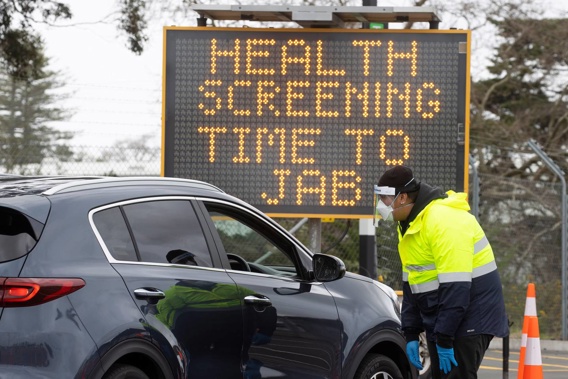
New Zealand is on the brink of a major border failure which will plunge the country into red, an expert warns.
University of Otago epidemiologist Professor Michael Baker is urging the Government to immediately tighten the border, including shutting off high-risk countries, in a bid to delay community transmission.
His warning follows confirmation of seven suspected Omicron cases in the community. There have also been more than 550 active cases detected at the border from recent travellers, the majority likely the Omicron variant. The seven-day border case average has climbed to 40, up from 31 a week ago.
Experts say Auckland could see 1800 cases a day within weeks of community transmission occurring. Prime Minister Jacinda Ardern has urged Kiwis to prepare for an outbreak, saying it's a matter of when, not if.
Baker and others are also urging everyone eligible to get their vaccinations and boosters as soon as possible to protect themselves from the virus.
As the nation waits with bated breath for a seemingly-inevitable Omicron outbreak, an Omicron case was confirmed in Palmerston North yesterday with at least 16 locations of interest.
There are three other cases confirmed in Auckland - and a fourth is suspected in a household contact.
And yesterday an Auckland Airport worker and their close contact were also confirmed as suspected Omicron cases, pending the results of genome sequencing.
1800 Covid cases a day within weeks of community transmission of the Omicron variant occurring. Photo / Brett Phibbs
Importantly these cases have direct links to the border and thus officials are more confident of containing any spread.
"Those individual cases have a known link to the border, can be contact traced and haven't led to further cases outside of close contacts who are isolating so aren't a trigger for moving to red at this stage," a spokeswoman for Prime Minister Jacinda Ardern told the Herald.
Community transmission has been set by the Prime Minister as the benchmark for tipping the country into the red traffic light setting - which includes restrictions for those unvaccinated and tighter gathering limits - in an attempt to limit spread.
Baker said the sheer number of Covid-19 cases in MIQ - now 559 in international travellers and the seven-day average for cases at the border hitting 40 - indicated New Zealand was on the brink of an outbreak.
"We've never had anything like that [regarding] infected people sitting in MIQ, ever, nothing even remotely close to that.
"The Omicron pattern is continuing almost inexorably towards an outbreak in New Zealand.
Baker said New Zealand had seen "almost every imaginable border failure" happen since the start of the year.
"Every time an infectious person gets on a flight to New Zealand, that increases our risk by a certain degree.
"We've had infected aircrew, we've had infected airport workers, we've had infected staff in MIQ and it looks like we've had a couple of people come out the other end of MIQ and still being infectious, like this remarkable case that went through Christchurch and is now in Palmerston North.
"All of those are low-risk events, but if you have sufficient infected people coming into MIQ, all those low-risk [events] add up into being a major failure at the border and being an outbreak."
Baker and colleagues have been calling for the Government to revert to a risk-based approach, where travel was reduced from countries that were generating a large number of cases.
"We did this with the Delta variant rather than one size fits all. We said if we're getting too many cases from a particular country we will suspend travel there from a period or we will put other restrictions in place."
"The simplest and most rapid approach is to do that."
Baker said another measure to help prevent border failures was tightening pre-travel testing, including requiring travellers to have a rapid antigen test at the airport before boarding an aircraft.
"If people are infected at that point, they shouldn't be getting on the flight."
Of yesterday's Covid-19 cases, which included nine new cases in Nelson as well as 11 in Auckland, the most worrying was the case in Palmerston North, Baker said.
Health authorities are yet to confirm the variant of those other cases, but confirmed the Palmerston North case was Omicron.
The person had returned five negative test results throughout their stay at a Christchurch MIQ facility.
On Friday the Ministry of Health announced Covid cases must now isolate for 14 days, rather than 10 days, and close contacts 10 rather than seven days.
Along with this, Baker said health authorities needed to look at whether the length of time international arrivals spent in MIQ should be extended.
"It may be that they extend MIQ to 14 days, back to what it was, or they consider requiring people to have a period of home isolation after MIQ."
Auckland University associate professor of public health Collin Tukuitonga said he wouldn't be surprised if Omicron was already in the community, but undetected, given its generally milder symptoms and our high vaccination rates.
Modelling released on Friday projected almost 2000 Omicron cases a day - 10 times the Delta peak - in the Auckland region within just six weeks of an outbreak.
Hospitalisations were expected to peak at close to 200.
Tukuitonga said he thought those models were probably conservative, but there were many variables at play, including if the virus spread through the health workforce.
He agreed with calls for the community to prepare for an inevitable outbreak, including stocking up on high-quality masks, but cautioned against panic buying.
Already some supermarkets are seeing pressure from increased demand for certain items, and warn that purchase limits may soon be introduced.
But they had learned from past outbreaks and were prepared for Omicron, saying there should be ample supply for shoppers, provided people didn't stockpile.
"Customers may start to see limits to the number of certain products in any one shop, this is to ensure there is a consistent flow of product onto the shelves and fair opportunity of product for all of our customers," Foodstuffs corporate affairs manager Emma Wooster said.
Take your Radio, Podcasts and Music with you









